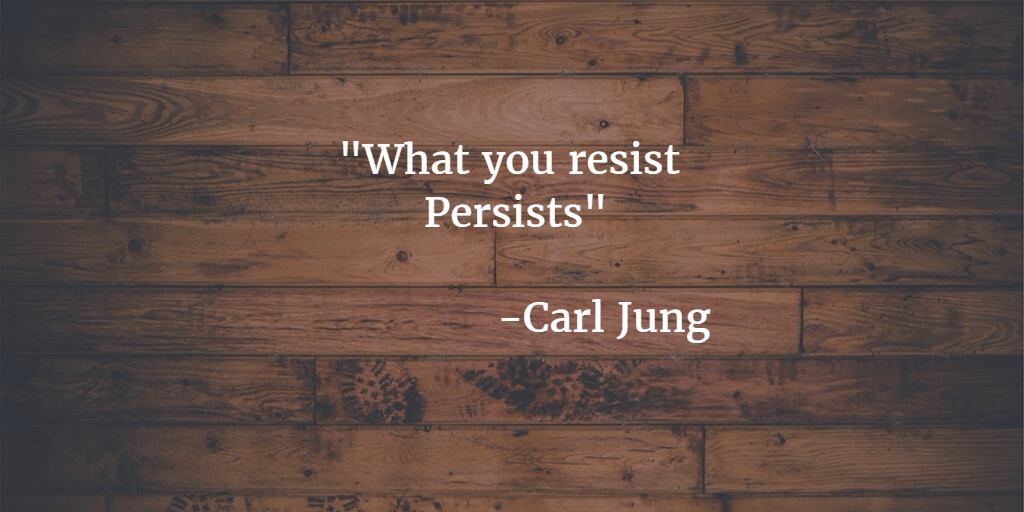 Why would we want to lean into something that is very distressing like anxiety? Because what you resist, persists.
Why would we want to lean into something that is very distressing like anxiety? Because what you resist, persists.
Leaning into your anxiety is one way to manage and cope with anxiety better. When we resist or fight our anxiety what happens is that we make it worse. It’s critical to avoid trying to make your anxiety go away or tensing up in reaction to it. Attempting to withdrawal or avoid from anxiety is futile so running away from the symptoms of anxiety is a way of telling yourself that you can’t handle it. This becomes ingrained in your mind, whenever your anxiety resurfaces that there is something that you should fear and that you can’t handle it.
An approach that works more effectively is to have a mindset that says, “Okay, here you are again but it’s okay I can handle this.” “I can allow my body and mind to go through the symptoms of anxiety because I’ve done it before.”
Acceptance of the symptoms is key to coping and the distressing physiological body reactions. This acceptance of anxiety even through the difficulty will allow you to ride the wave, move through it and pass it. Adrenaline is what causes anxiety and if you can just let it go, while knowing that anxiety even though scary at times will not kill or harm you.
The knowing and acceptance of allowing your physical reactions to just be there whether its heart palpitations, chest tightness, sweaty palms, or arm pits, tense jaw, dizziness;etc. Not all Individuals have the same reaction to anxiety and may have different symptoms. caused by this surge of adrenaline. It will pass soon if you are able to just remember to let it be and ride it out. Often our adrenaline that was released becomes metabolized and reabsorbed within about 5 minutes. As soon as this occurs, most people start to feel somewhat better and their anxiety decreases. In minor cases, anxiety will come to a peak and eventually subside within a few minutes. Some anxiety may persist for a while longer, but the worst is over in a short time depending upon how resistant the individual is. The more you allow it to just be there without avoiding or withdrawing from the anxiety, the quicker it will pass. Our self-talk may also create a problem depending upon what we say about the anxiety. If we are negative about it and use, “what if…” statements this can aggravate it and prolong our suffering.
Know When To Assemble Your Defenses
 When your symptoms of anxiety start, it’s essential, but then it’s time to take matters into your own hands. Anxiety and worry are mental states where you may feel vulnerable, like your going crazy, or things are out-of-control or even frozen to do anything to change the situation. Standing still and doing nothing is not the answer, and may only serve to maintain it or even build it up, leaving you feeling like more of a victim. At the initial onset of anxiety, it’s more constructive to always accept the anxiety, then realize that there are many things you can do to redirect the energy spent on anxiety into something more productive. To summarize, don’t fight or resist the anxiety but don’t do nothing either. Allowing it to just be there is one of the best things you can do about it.
When your symptoms of anxiety start, it’s essential, but then it’s time to take matters into your own hands. Anxiety and worry are mental states where you may feel vulnerable, like your going crazy, or things are out-of-control or even frozen to do anything to change the situation. Standing still and doing nothing is not the answer, and may only serve to maintain it or even build it up, leaving you feeling like more of a victim. At the initial onset of anxiety, it’s more constructive to always accept the anxiety, then realize that there are many things you can do to redirect the energy spent on anxiety into something more productive. To summarize, don’t fight or resist the anxiety but don’t do nothing either. Allowing it to just be there is one of the best things you can do about it.
What Can You Do To Take Action
There are three main types of strategies that can be effective for some people. In order to offset anxiety there are coping strategies in the moment that may be helpful. Coping strategies are active techniques that may help distract from what your going through without avoiding it. Coping statements may also be helpful by using mental techniques designed to redirect your mind away from and replace fearful self-talk. Others may find that affirmations, which are much like coping statements can be useful but intended to work over a longer period of time. These coping statements, and strategies can help you to get through a specific incident of anxiety, while positive affirmations work with changing your limiting beliefs. An example, a coping statement or strategy may get you through a challenging situation, and you could also bring to mind an affirmation about being free from fear you have been working on for months.
Strategies For Coping
- When anxiety, or worry starts, you can try the following:
- Relax your body through breathing exercises to offset acute anxiety. Slowing down your thinking and listening to your breathe can reduce your anxiety.
- Relax your mind. Take 20-30 minutes to do a guided meditation or visualization.
- Face your fears by taking active steps.
- Nurture your self by doing a better job of giving yourself self-care. Do pleasurable activities like talking to friends in person or over the telephone, eating a tasty meal, having a warm bubble bath, or having a massage, can be helpful.
- Distract yourself from your worrying thoughts.
- To deal with the anxiety, plan to effectively cope with the worry by having an action plan.
There are other coping strategies beyond these too that can help deal with all levels of anxiety from worry and mild apprehension to panic. The most popular strategies are listed here below.
Talk to a healthy support person in person or on the telephone. In order to get out of your mind and to not focus so much of your attention on your body symptoms and thoughts by talking to someone over the telephone you can distract yourself.
Engage and participate in an activity or move around. This physical activity may allow you to wear off some excess energy or adrenaline which is created by this fight-or-flight response that can occur with acute anxiety. Move with the anxiety instead of resisting it and the physiological symptoms. If you find yourself at work or at a meeting, try taking a walk to the bathroom and back or walk outdoors while getting some fresh air for about 10 minutes or more. When you’re at home you can do housework by cleaning that junk drawer out, or mopping the floors. This physical activity can help you get out of your head by riding on a stationary bike or jogging on a treadmill. Gardening is also very therapeutic and an excellent way to refocus your energy from the anxiety.
Stay In The Moment
Often individuals who are feeling the effects of anxiety, are either living in the past or thinking about the future. If we focus on what’s happening in the moment and on specific concrete objects in your environment can help ground you. Or if you’re at the grocery store, you might look at the cashiers, or people standing around or even at various magazines next to the cash registers. Should you be driving and struggling with your anxiety, you can focus on the other cars in front of you or on the other details of the surrounding environment. Staying in the moment and focusing on what yo see can help minimize the attention you give to some annoying, stressful physical symptoms or catastrophic “what if…” thoughts. If there are objects nearby you might try to actually touch these to reinforce staying in the present moment. Another grounding exercise to focus your thoughts is on your legs and feet. As you’re standing or walking around, pay close attention to your legs and feet and imagine that you are connected to the ground and have roots coming from your feet into the ground.
To find out how we can help you to reduce your anxiety, contact us now at admin@ovcs.ca.


